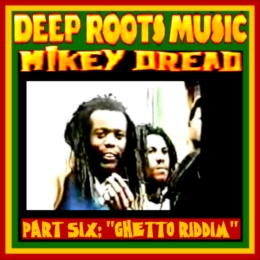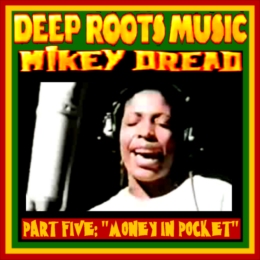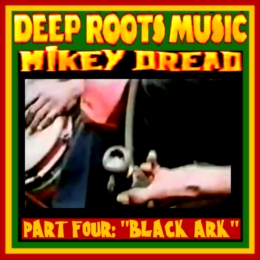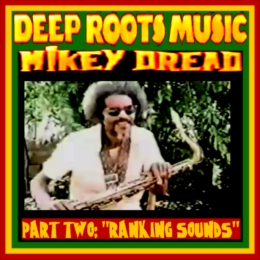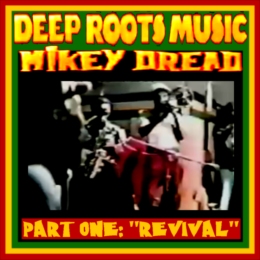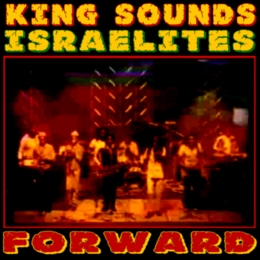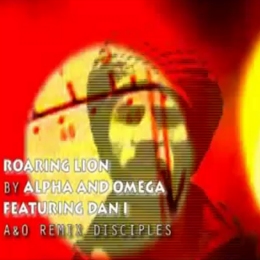- DUBROOM MAIN PAGE - INTRO - REVIEWS - ARTICLES - MESSAGE BOARDS - FAQ - PRIVACY - CONTACT - MAILING LISTS -
Sunday, March 15, 2009
PETER BROGGS - SING A NEW SONG (DISCOMIX)
WWW, March 2009 - The riddim went through many remakes, but this is the original. Spiritual Roots Reggae, straight from the vaults of Studio One! Peter Broggs sings praises to the Most High, after which the echo machine starts running.
Saturday, March 14, 2009
QUEEN IFRICA - FAR AWAY...
WWW, March 2009 - On a lighter note, Queen Ifrica brings us this rendition of the secret admirer who just can't get that guy to draw her attention. Or something like that. Sweet Lover's Rock, 2009 style!
Queen Ifrica isn't known to limit herself to Lovers tunes. Her conscious tunes are not the obligated number that many artists seem to play. After all, every Reggae artist has to at least make one tune about Jah or a conscious topic. And surely not all of them mean what they sing...
However, to dismiss lovers tunes is to dismiss the fact that love between a man and a woman is a fact in so many people's life. This one is for them, and for all others too, who love some Reggae Music!
Friday, March 13, 2009
BLI GLAD, PETER AG AND FATMAN - KAERLIGHED TIL FOLKET
The Danish Bli Glad band, meaning something like "Rejoice" or "Be Happy", knows how to play a riddim. Their cool, Ire Reggae is capturing with a positive vibe. The fact they sing in their native language, doesn't matter. The language of their message is Love and not war, a message much needed in this troubled times.
Be good to the people around you, do good and get good, there is nothing Danish to that message and that message is well overstood.
Enjoy!
Tuesday, March 10, 2009
DEEP ROOTS 6: GHETTO RIDDIM
WWW, March 2009 - In the last episode of this six-hour Reggaementary hosted by Mikey Dread, we take a look at the Ghetto's of Kingston Jamaica, where the classic Channel One Studio's is located.
If anything has become clear thoughout the five hours that preceeded this last one, it is that Reggae Music is first and foremost a sifferer's music. It has a direct connection with the Africans who were taken from their homeland to build the cities of Babylon, only to have the most of their posterity live in the ghetto until this day.
The camera takes us to the heart of the ghetto. To the mobile record store that features in many books about Reggae. We see the store and the owner live and direct, as he explains where he is coming from, why he is doing what he is doing and what a gwaan.
We meet the Singers and Players of Instruments. They speak about the liberating force of Reggae Music, how Reggae Music is really a Spiritual Music that chants down Babylon. We hear words of hope, words of justice, righteousness. After the reasoning, time to to pick up the instruments and start rolling the tape.
Political violence killed thousands of Jamaicans. Nowhere was it felt like in the ghetto's. The ghetto's is where Babylons downpression comes down the hardest. Two rivaling political parties form the main catalysator of the violence, which can better be described as a civil war.
It is in this situation that we find Channel One. We find musicians waiting for session work, Inside, the Mighty Diamonds record "Right Time". Outside, people gamble.
In the meantime, the mobile record store drives through Kingston and producer Jack Ruby holds audition in his backyard. Vocal harmony in the ghetto's, like no one in Hollywood can ever reach with fancy tricks, not even in this 21th century. The reality of Kingston 12.
The hour, and since this is the last episode, the whole six-hour ends with Jack Ruby talking about the real situation in the ghetto. Speaking about what he is trying to do as a producer, he is surrounded by singers and players of instruments and the reasonings goes deep as world politics (Vietnam) is brought up and politicians using Reggae Music for their own goals.
Deep Roots, originally produced in the early 1980's for the UK based Channel Four Television, truly is one of the best documentaries ever made about Reggae in a time where in the music was formed.
Monday, March 9, 2009
DEEP ROOTS 5: MONEY IN MY POCKET
The time was hot. Politics, crimes, violence, people suffered big time. Something had to be done and the King of Reggae was needed. However, Bob Marley was in the UK. He was there for a reason too: he merely survived after having been shot himself.
Leaders went to the UK and asked Bob Marley to help them out. The result was the now famous One Love concert, where Bob Marley managed to have the two main political leaders, that split the country in two, shake hands together.
We see the historical recordings, and are then taken to an interview with both political leaders. How do they think about it all, looking back? We see and hear them as they speak about Bob Marley, Reggae, and the influence on the political and social situation.
One of them, before getting into politicks, was also in the music industry. He worked with Prince Buster and Duke Reid, but also with Dennis Brown, the singer who gave the name to this episode of Deep Roots.
Time to take a closer look to the Music Business. National and international. We meet up with the major distributor during a business talk over the phone. We meet up with producer Harry J in the studio, too, as he records one of the top female singers.
The tapes are rolling, as the sistren sings words of wisdom into the microphone. Producer and engineer are listening concentrated: this has to be recorded with the highest care.
Harry J's studio has an Ire Sound, which attracted Bob Marley and the Wailers. In an interview, he speaks about his own history as well as that of Bob Marley as they used his studio. Just a year after he started off in 1971, they already wanted him and in 1972 Catch a Fire was recorded in Harry J's.
This is also where Chris Blackwell enters, the former owner of Island Studio's who was influential in selling Reggae Music to a western audience, by adding all kinds of things to the raw rhythm. This is where Reggae was indeed made ready for a world wide audience.
We also hear about a huge argument between the three original Wailers: Bob, Bunny and Peter. Chris Blackwell then decided to record Bob Marley separate from the others. This happened during the recording of Burnin', the second album. Harry J was there, when the Wailers became Bob Marley and the Wailers with the I-Three's on backing vocals. We see live performances Rita, Marcia and Judy as well.
With shots of Randy's, the record store, Mikey Dread introduces us to another influential female in Reggae Industry: Sonia Pottinger, aka Mrs. P. As she sits behind her desk, she tries to explain that for her there is a big difference between business and religion. Business, being the music of course.
We then turn to Marcia Griffiths, who is sitting there with Mrs. P. Before she joined Bob Marley's backing vocals, she was around Sonia Pottinger who had already told her that her voice would get her far. She tells us about the influence of Bob Marley and the Wailers, of Reggae, of Music. But when she's asked about her religion, she looks at Mrs. P and smiles, saying: "I don't wanna talk about it".
We also meet up with Dennis Brown. The songwriter is announced as the Prince of Reggae, as he sings in the studio with only a guitar to accompany himself.
From the Recording Studio to the Radio Studio, where a young Deejay is waiting to give some crucial Rub a Dub style toasting Live and Direct.
Back to the Recording Studio. Dennis Brown is ready, waiting to voice another crucial riddim, this time without guitar. Shots from the impressive mixing board in the Studio that is getting rather cloudy...
When the session is over, Dennis Brown is interviewed. He speaks about his time at Studio One, which for him was like a college. Coxsone's Studio is where things took place back in the 1960's, and as Dennis brings up memories, shares reasoning and singing a bit it becomes clear where the Prince Of Reggae coming from.
Towards the end of this fifth episode of Deep Roots, Dennis Brown talks about the song that gave the title to this hour, after which he ends with a cry for repatriation.
BUJU BANTON - PAID NOT PLAYED
WWW, March 2009 - The flying cymbals, invented in the 1970's, are revisited in the Drum Computer and stripped of everything else. Enter a Hip Hop beat and some synthesizer sounds, et voila...
Sunday, March 8, 2009
DEEP ROOTS 4: BLACK ARK
WWW, March 2009 - In the first shots of this episode, we go to the beach where another Jamaican producer rises out of the sea and explains what is going on around him, in his vision: indeed, it is time to visit Lee Perry before he burned down his Black Ark Studios.
But before we go there, Mikey Dread shows us where the name Black Ark comes from. We are introduced to Marcus Garvey, the Jamaican black freedom fighter who is said to have prophesied the coming of Haile Selassie.
Lee Perry is still there, too, at the sea side. He walks and talks in his own way, open for everybody's interpretation. Arguably, Lee Perry is the most remarkable person in Reggae Music. Before we meet him in his studio, as said, we are introduced to him and his family at the wonderful seaside of Jamaica.
Mikey Dread continues to tell us all about Lee Perry, after which we are taken to some Idren smoking herb and chanting down Babylon: it is time for the Deep Roots series to go into yet deeper Roots of Reggae.
As the chalice blaze, everyone give thanks and praise. The drums play the Nyabinghy rhythm: a heart beat named Death To Black And White Downpressors. It was Count Ossie who made the rhythm known, a rhythm very much connected to Reggae but musically not the same.
It was Count Ossie who played the drums when the Ethiopian Emperor visited Jamaica: a historical event that is -needless to say- one of the most important events in the history of Jamaica. The event is extensively covered in this hour, too. And it has some pretty touching scenes: Rasta's who are being given medals by the Ethiopian Emperor, for example.
Back to the Nyabinghy session. More and more reasonings, meditations, and bible chants. More clouds, too.
After this foundation, we enter Black Ark Studio's where Lee Perry is ready to introduce himself and the studio he was going to burn down later. In the video, however, he takes off his shoes in a symbolic act of respect towards the works that have been produced in Black Ark. Music that stays vital until this very day.
The Perry Family starts playing music as we are taken into the mixing room, finding chords as they jam on Marley's "No Woman No Cry". Lee Perry continues to talk and after a while, we find him behind the microphone where he voices a riddim, gets a box of collie, lights it up and voices some more.
Suddenly, we are takes to a session with vocal group the Mighty Diamonds. The contrast is, let's say, kind of telling. When the finish their song, we are already looking at the historical sights of Haile Selassie's coronation. Mikey Dread tells us about Ethiopia and the spiritual significance, and Bob Marley's track "war", of which the text was a speech by His Majesty. We see the King of Reggae in action, performing the track in closure of yet another episode in this must-see documentary series.
Saturday, March 7, 2009
DEEP ROOTS 3: THE BUNNY LEE STORY
WWW, March 2009 - In the third hour of this excellent six-part series hosted by Mikey Dread, we go straight to the works of Bunny Lee, the "Hit Maker From Jamaica". Get ready for some massive sights and sounds!
Ten o clock in the morning: Bunny Lee, Prince Jammy and Wayne Smith get together for a recording session. The video camera is there too, Mikey Dread has once again chosen a crucial place to check out the vibes in Jamaica during the early 1980's.
After this session, Mikey Dread resumes the story of Duke Reid (see previous episode). Bunny "Stryker" Lee, namely, worked together with Duke Reid. He was on his way to become one of the biggest producers of Jamaica. It was a time wherein beauty contests were in full swing, just like the music mixed by Prince Jammy in the early morning session.
A session where we are taken straight back into, after the short resume. Delroy Wilson is next, after Wayne Smith. We go back to Prince Jammy and Bunny Lee as they work on yet another great production.
When Delroy takes of the headphones, it is time to get to know Bunny Lee and his mother a little bit better. She shares memories, the link to slavery is shown, and we get to know another musical predecessor of Reggae, Mento.
That is, before we go back into the studio. It is time for Bunny Lee to talk about Duke Reid and just how he got to get into the Jamaican Music Business. Time for Delroy Wilson to tell a little bit more about himself, being the veteran singer in the studio, singing before Bunny Lee got into the Music Business.
Bunny Lee is well-known for his works with Johnny Clarke. We meet him, he is in the studio as well. With a soft voice, he speaks about his lyrics and identity as a Rasta.
We continue to go further back in time. To the 1940's. Nat King Cole, an American singer who decades before Johnny Clarke would voice into Bunny Lee's microphone, was an inspiration for the Jamaican singers. He is featured, before we are taken back to the studio where the conversation continues in word and lyric...
Singers continue in the studio to sing into the microphone. Classic tunes, brand new vibes, especially Johnny Clarke is crucial once again, as Prince Jammy rides the mixing board spicing up the sound. He is a protégée of King Tubby, to which the viewer is introduced towards the end of this hour.
The Godfather of DUB unfortunately is not there himself, but Prince Jammy dubs it up and the video camera is there to register it. Bunny Lee skanking on the riddim as the DUB is recorded: a truly unique piece of footage...
Friday, March 6, 2009
DEEP ROOTS 2: RANKING SOUNDS
WWW, March 2009 - The second hour of this 6-hour Reggae History with Mikey Dread as our host opens up with Tommy Mc Cook, saxophone player for the Skatalites. He knows all about the Ranking Sounds he helped to shape in the 1960's.
It was a time wherein Rastas could not freely walk in the streets, as they would be persecuted by police. Times of severe downpression, a Great Tribulation. Tommy Mc Cook tells about it. Rasta's took the Biblical warning to go to the hills and it would take a long time before some of them would finally break some of that tribulation.
The Power of Music, or: Ranking Sounds!
Tommy Mc Cook tells the story in word and sound, showing how the beat went down in tempo from Ska to Rock-Steady to Reggae. We also see the full Skatalites band in the Studio as they play the Music into the recorder.
But it was not just the bands who were influential in shaping the music. The Sound Systems were equally, even more important, as they would play the recorded music directly for the people.
Duke Reid was one of them, a former police officer whose widow tells us all about what happened back then. Nuff things: Duke Reid carried a gun, protecting his music and equipment.
The art of Toasting came out of that particular time in the 1960's as well. It was U Roy who first recorded it, but Count Machuki is said to have been the first to do it. He is featured in the second hour of Deep Roots, explaining where his style is coming from.
Next to the Count is Lord Comic. He does not always agree with what is said, and he says so, too. The tune in question is "My Boy Lollipop", which was a great Hit in the UK in 1964. We see a recording from the time, in extreme up-tempo.
As an answer to the question what the original DJ thinks about Reggae DJing in the time that the video was recorded, he says that the biggest difference is that "they now have to find a thing called lyrics". After that, we see a young U Roy in session.
Back to Lord Comic and Count Machuki. They boldly take the microphone and start to chant over the music that was hot in the days the video was shot. The styles of these original Ska DJ's become apparent in an entertaining session full of Comical scenery.
Not everything was comical in the days of the early Sound Systems. The police had their hands full, as well as the several posses that accompanied the different Sound Systems. War and Rumors of War? This is not so uncommon in Jamaica, where sufferation is the order of the day as we see in the video.
For the remainder of this 2nd hour, We see Jack Ruby and his Sound, too. The music has become Rub a Dub style, the technology is further, the DJ's chant it up, the people dance: some things change, some things don't.
Thursday, March 5, 2009
DEEP ROOTS 1: REVIVAL
WWW, March 2009 - With the hand drums in close-up, the horns close by, here is the introduction to a 6 hour excursion to Jamaica in the year 1980. Your host is none other than Mikey Dread at the Controls!
Part 1, entitled "Revival", takes us to the Roots of Reggae, which is directly related to slavery. The story of slavery, when Africans were taken from their homeland to work for the Babylonian colonizers, is explained. Drums were forbidden, torture was the rule: but in all this tribulation, the Africans did keep and develop their culture and dignity.
The enslavers, who claimed to be "Christian", looked down on the Africans. They kept their white religion for themselves, but in 1784 the first Black Church, called "The Ethiopian Baptist Church", was established. A significant event in the further development of Black Spirituality and Culture on Jamaica.
We're taken to what in the meantime has become a rich spectrum of Revival and other Spiritual Movements, all of them having their influence in shaping the Music that we love so much: Roots Reggae, Deep Roots Reggae.
Musically, Reggae has predecessors like Mento and Ska. These musical styles were as much connected with the Jamaican Spiritual heart-beat as Reggae is today. This connection becomes very clear in the long explanations and filmings of sessions.
It has to be clear, before we can continue to go into the Ghetto to meet the Skatalites, the band that had Studio One as their basis. Studio One, where most well-known Reggae artist have one or more times practiced their talents and skills.
As they talk and sing, it become clear that this is 1980. The Skatalites were already legends in Jamaica, as they were very much responsible for creating the rhythm and sound called Reggae some 15 years before that. Things had rapidly changed in that 15 years, and yet, some things stayed the same.
The Nyabinghy rhythm of the Rastafarians, for example. The percussionist starts to explain where he's coming from and plays the rhythm, singing over it...
Another influential group is Toots and the Maytalls, whose tune "Do The Reggay" is said to have given name to the Music, even though the spelling is -for obvious reasons- a bit different today. We see them in an old, old live performance, when Ska was still the music of the time.
Ska was heavily promoted by the first government of Jamaica after independence was declared, in order to promote the indigenous music from "Yard". Jimmy Cliff was another Super Star from that time. We see him too, in black and white film from the 1960's.
Just before the end, we fast forward to 1980 and meet up with Jimmy Riley, who was there back in the 1960's when Reggae came into existence. As he is singing "Poor Immigrants", he reflects on what was then already a Reggae History.
Part 1 of "Deep Roots" establishes a solid foundation for the five hours of essential Reggae History that are yet to come.
Wednesday, March 4, 2009
ALPHA AND OMEGA WITH UPRISING FEATURING JONAH DAN - DON'T FIGHT DUB
In a steady stream of psychedelic video work-out's from UK DUB's very own Dynamic Duo, we get to know Alpha and Omega as standing out within this outstanding discipline within Reggae Music.
This video is one of the most recent additions. Jonah Dan, the well-known UK ROOTS vocalist teams up once again with Alpha and Omega plus Uprising with the usual unusual result.
Monday, March 2, 2009
KING SOUNDS AND THE ISRAELITES - FORWARD (LIVE, 1981)
WWW, February 2009 -Unfortunately, the video cuts off just before the end of this impressive 1981 performance. A warning to president Mugabe who just went into power and to the people of the world!
King Sounds, fe true. Even though the performers, both band and vocalists, are pretty much unknown by today's Reggae Lover, each and every one of us will enjoy this Roots Rockers Music, Live and Direct.
King Words, too. In 1981, Robert Mugabe was the first leader of Zimbabwe. Before that, the country was named after Cecil Rhodes, whose scholarships made many people become members of the word elite. People like Bill Clinton. Just Google "Rhodes Scholar", and be surprised...
The tune is called "Forward", and performed over 25 years ago. What was "Forward", then, is "Today" now!
Those who frequently watch the news, know that Zimbabwe is in deep, deep trouble. The western world stands at the forefront in washing their own hands in innocence, while pointing the finger to Mugabe. Not really the picture that King Sounds and the Israelites had in mind, over 25 years ago.
They did have a warning, though. There is a thing, to never forget: Babylon is always looking for the riches of Africa and Africans, and will not stop doing so until JAH will finally downstroy her.
History, by the way, tends to repeat itself...
Sunday, March 1, 2009
ALPHA AND OMEGA WITH THE DISCIPLES FEATURING DAN I - ROARING LION
WWW, February 2009 - What happens when two of the Top UK DUB Producers join hands with a crucial vocalist and video maker? Exactly, that's what you wanna see.
hard stepping, militant beat is one of Russ D's specialties. Together with his collective The Disciples, he's caused several earthquakes in dances all around the world. Just like Alpha and Omega, the Dynamic UK DUB Duo that chose the deepest bass as their trademark.
In this video, they join hands in what has become a massive track, massive among the massive that is!
The accompanying vocal and video work is of the very same quality as the excellent track, altogether forming an experience that on one hand is way to long, but on the other hand also wants you to watch the other Alpha and Omega video's, reviewed by the Dubroom or not.




